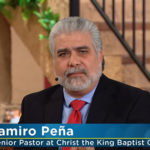Posted: 11/30/07
Lectionary helps some Baptist preachers
feed their flocks a ‘balanced diet’
By Robert Dilday
Virginia Religious Herald
RICHMOND, Va.—It’s Saturday night. Do you know where your pastor is? A pretty safe guess might be “in a study, frantically developing the next day’s sermon.”
But how does a preacher decide on the Scripture text? Some free-church Baptist pastors find their answer in the liturgical toolbox. They preach from the lectionary, a centuries-old cycle of Scripture readings assigned to each Sunday of the year.
In general, a lectionary is a collection of Scripture readings appointed for worship on a given day. Today, most Protestant churches use the Revised Common Lectionary, which includes readings each Sunday from the Psalms, the Old Testament, the Epistles and the Gospels, organized into a three-year cycle.
“I preach from texts I would never preach from if I did not follow the lectionary,” said Chuck Warnock, pastor of Chatham (Va.) Baptist Church. “Sometimes that poses a challenge. Sometimes I think the texts are not that great. But I dig into them and have been blessed by that discipline.”
| See Related Articles: • Preaching: Stand and Deliver • Integrity demands preachers avoid pulpit plagiarism • Lectionary helps some Baptist preachers feed their flocks a 'balanced diet' |
Mike Clingenpeel, pastor of River Road Church, Baptist, in Richmond, Va., and David Washburn, pastor of First Baptist Church in Waynesboro, Va., echoed that rationale for using the lectionary.
“It guarantees I don’t preach my pet themes,” said Clingenpeel. “The lectionary sort of channels me away from my own subjective feelings. Besides, it balances what the congregation hears.”
Washburn said tackling difficult texts “makes me cultivate a different style of preaching.” Following the lectionary “helps me grow as a preacher and teacher, and we certainly hope that will spill over into the congregation,” he said.
Retaining flexibility to respond to events in the congregation or community keeps some pastors from rigidly adhering to the appointed readings.
Kyle Reese, pastor of Hendricks Avenue Baptist Church in Jacksonville, Fla., typically follows the lectionary in preaching, but he noted “the ebb and flow of life” dictates times when he needs to depart from the prescribed texts.
Even so, he noted many times when he initially thought circumstances would require him to find a text to address a specific situation, but he was surprised to discover the lectionary reading fit perfectly.
Bill Shiell, pastor of First Baptist Church in Knoxville, Tenn., agreed. Even on the Sunday after the Sept. 11 terrorist attacks in New York and Washington, he discovered the lectionary Scriptures provided an appropriate text for the occasion.
Other reasons cited for using the lectionary:
• It connects local churches with the global Christian community. “Millions of churches around the world read the same passages each Sunday,” Warnock said. “I like being a part of the global church as it gathers for worship in thousands of different expressions, united by common Scripture.”
It unites the Christian family at-large by providing a common focus, Reese added.
“Entering into the broader community of the church is invaluable,” he said. “That particularly resonates with the 20-something and younger crowd who want to be a part of something bigger than themselves.”
• It can immerse worship services in Scripture. “Often I adapt the Psalm as a call to worship or call to prayer or as some other liturgical element in the service, to which the people respond. We try to use the texts pretty extensively, so that there’s more than just a nominal reading of Scripture in worship,” Clingenpeel said.
The variety of Old Testament and New Testament texts “work together and weave a tapestry of witness and story that is majestic,” Warnock observed.
• It makes selection of texts easier each Sunday, while offering almost unlimited texts over the long haul. Since the lectionary covers the entire Bible in a three-year cycle, “if you want to preach through the Bible, use the lectionary as your guide,” Warnock said. “Somebody else figured it out for you. Saves you a lot of time, plus a lot of thought, prayer and study was invested in choosing these texts.”
Because there are four readings appointed for each Sunday over three years, “theoretically you could preach for 12 years without ever repeating a text,” said Clingenpeel, who, after serving his current church four years, has preached through the cycle once.
A flock fed from the lectionary should benefit from a “balanced diet,” said Joel Gregory, professor of preaching at Baylor University’s Truett Theological Seminary.
“The up side of the lectionary is that if a preacher follows it, the congregation will get a balanced diet of Scripture over three years,” Gregory said.
With additional reporting by Managing Editor Ken Camp














We seek to connect God’s story and God’s people around the world. To learn more about God’s story, click here.
Send comments and feedback to Eric Black, our editor. For comments to be published, please specify “letter to the editor.” Maximum length for publication is 300 words.